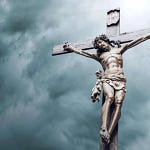A Legion of Demons
In great misery and nakedness, he wandered among the graves of the dead. He was in utter wretchedness, leading a disgraceful life. He was a proof of the cruelty of demons and a plain demonstration of their impurity.
Cyril of Alexandria, Commentary on Luke
These are the words of the early Church Father Cyril of Alexandria, describing the plight of the man possessed by a legion of demons in our Gospel story this morning. So we begin a journey through the Gospel of Luke on which we will be taken by our lectionary over the Sundays of ordinary time. And we begin with one of the most intense and extraordinary situations of all. For modern, apparently civilised people like us, all of this may sound very strange: a person possessed by man demons, his nakedness, madness, ravings, the chains he broke with superhuman strength, talk of the abyss, and the destruction of a herd of pigs.
How do we understand then the plight of this poor man and its relationship to our lives? We can pick out a few things
Firstly, it is quite clear that this man was living in a Gentile region, and so this would have been his first encounter with Israel’s Messiah, Jesus Christ. We can also see that his torment had lasted a long time and removed his dignity from him, removing him from civilised company and causing him to live among the tombs. So driven and controlled was he by these demonic powers that he could not be bound by a chain, but was possessed of such agitation that he broke free from all physical constraint.
When Jesus approached him, the demon spoke through the man’s body. A conversation ensued in the course of which Jesus asked him, “What is your name?” And he said, “Legion.”
The word “Legion” in context referred to a unit of the Roman army which numbered 5,000 men. How to understand this? Literally, that the man was possessed by many demons and therefore must have been opened in some way to a radical form of evil.
But symbolically, we might see here something of the human condition as it is affected by sin. The great Church Father St Augustine spoke of his state before he came to know Christ by saying, “I have become a question to myself”. What he meant by this was that he was confused and tormented by the tangle on contradictory impulses that existed within his soul, desiring at one time one thing and at another time another thing. But, upon obtaining anything, his impulses and desires would shift and he would never come to know the true rest and happiness for which he was searching.
We can surely understand, then, what is symbolised by the legion of demons that possesses this man because surely we are all familiar with this sense that we too are composed of many different, shifting and, at times, contradictory desires. We are, in that sense, questions to ourselves, not understanding ourselves – what we need, what we desire, what can truly make us happy and give us peace. And so we follow whichever voice within us shouts most loudly in the hope that, by following, we may find relief.
And we might even go further and say that we can fully identify within this man’s torment and the beastliness of his existence. When we think of ourselves in our lowest moments – when we are truly possessed by the impulses of sin in anger, lust, or some other uncontrollable passion – we recognise that we are, in some real sense, possessed by something. We are not in our right mind but have given ourselves over to base impulses which control us and degrade us so that we are not how and what we know we should be.
We are invited by our Gospel reading today, then, to step back from ourselves and to observe. What do we see? We know that there are times when we are possessed and controlled by powers that are, in some sense, outside of ourselves, of our real selves. We know that we need God’s help – Christ’s help – to deliver, heal, and restore us.
An Encounter with Christ
This is the situation. What is the answer? The answer can only be the grace of God in Christ. Observe how Christ has crossed a tempestuous sea to arrive at the country of the Gerasenes where this possessed man dwells. This man did not seek him out but found him already present to him in his misery and in his death-like state.
And so the good news is for us: the grace of God has been made known to us in Christ. He comes to each one of us without our asking him to. He invites each one of us to respond to him in faith. And, as we respond to him in faith – and as we continue to respond to him in faith – we are restored to the image in which humanity was made to begin with, that is, the image of God.
In our story today, all of this happens in a flash: Jesus encounters the man and casts out the demons, and then man is simply healed. That is the Christian life in miniature. Jesus Christ is in heaven at present and he has sent his Holy Spirit upon the Church and upon his followers. We encounter him now in lives of prayer, through the Sacraments of the Church, particularly in the Sacrament of Holy Communion, and through the Word of God.
We see the effect of all of this in a beautiful image: ‘The people went out to see what had happened, and they come to Jesus and found the man from whom the demons had gone, sitting at the feet of Jesus, clothed and in his right mind, and they were afraid’ (Luke 8:35). Whereas once this man has been naked, undignified and possessed, now he was clothed and given his dignity again. He was in his right mind. The Greek word from which this comes is sofroneo, which speaks of being of sound mind, in possession of one’s faculties, of having wisdom.
All of this – this peace, this wisdom, this dignity – comes from the man’s proximity to Christ and his attentiveness to his words.
A word of encouragement again: for us, this is a process which takes times. Can I be honest and tell you that I am frequently disappointed with my progress in the spiritual life? Not only with my lethargy, but also with my inability to control my conflicting impulses. Friends, it is the same for all of us. Do not wallow in shame, but come to Christ and allow him to heal you and to bring you back to your right mind. It’s all here for you in the manifold grace of God which he has given to his Church.
A Word on What Happens Next
Finally, a word on what happens next. The man asks to accompany Jesus on his way, but Jesus will not allow it. How often we feel that we would like to remain in a state of pure spiritual contemplation but we are denied it by the clamour of the world and the demand that daily life places upon us!
Here also, being healed of his demonic possession, this man is able to play a role in the Kingdom of God. This too happens to us: as we grow and mature in our faith, God is able to use us in the Church and in the world to advance his Kingdom. When we are possessed by evil, we can only think of ourselves and our own base desires and needs. No responsibility is given to us, nor should it be. But, as we grow in holiness, we are given more to do. This is the deal. It is the law of the Kingdom of God. Jesus himself says this later on in the Gospel of Luke: “Everyone to whom much was given, of him much will be required” (Luke 12:48).
What is the job Christ gives to this man? ‘“Return to your home, and declare how much God has done for you.” And he went away, proclaiming throughout the whole city how much Jesus had done for him’ (Luke 8:39).
The mission is no different for us: to proclaim what Christ has done for us. But, friends, let us not be burdened by this task, as though the Church is nothing but a religious pyramid-scheme and we the miserable underlings who are called to propagate an arbitrary message to bring in the customers. It can sometimes be communicated like that and feel that way.
Rather, let us observe the order: recognition of our own lostness and our need for Christ, the gracious balm of his presence, our own growth in holiness and wisdom, and then the commission: go out and let the world know all about this Jesus. Let your light so shine before men.
Now, of course, life is not always so simple that things progress in such a linear order but I think there is a great truth here. In order to share Christ with the world, we must first have encountered Christ in a of tangible way. When we encounter his love and his goodness, we sense his life and his power living within us and it becomes natural for us to share him with the world. We resemble him. We look like him. Speaking of his love and goodness becomes not a burden, but a joy, flowing out from us like a river from the ocean or like a beam of light from the sun.
Friends, are you tormented in your soul? Let me exhort you to come to Christ, sit at his feet, allow him to turn you around, heal you, bring you back to your right mind and to a place of peace. And then, to go out into all the world and share his goodness with those are similarly in need.
In the name of the Father and of the Son and of the Holy Spirit. Amen.












Share this post